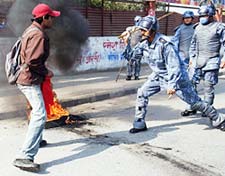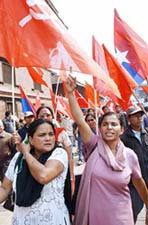|
| Help | |
| You are here: Rediff Home » India » News » Special |
|
India and the United States seem to be working at cross-purposes in carrying forward their strategic interests in Nepal. While the US is supporting King Gyanendra and flirting with idea of supplying arms to the Royal Nepal Army to strengthen the hands of the monarch, India is covertly bridging the gaps between the seven party alliance and Maoist extremists who are locked in a deadly war with the establishment headed by the king. The Maoists on Monday announced a unilateral indefinite ceasefire in the Nepalese capital Kathmandu, ahead of this week's massive pro-democracy protests against King Gyanendra's regime. But the crisis is far from resolved. In India, two clear opinions have emerged out of the Nepal crisis. One school of thought believes that the Maoists should not be trusted under any circumstance and India should not help, overtly or covertly, to bring them to power.
The Manmohan Singh [Images] government -- probably under the influence of its allies, the Communist Party of India-Marxist -- believes that people's aspiration for democracy is overwhelming in Nepal and popular support for the king is on the wane. Many independent strategic thinkers in India also believe that the beginning of the end of Nepal's monarchy has already begun. Image: Nepal riot police lathi-charge a student participating in a March 24 protest against the arrest of the head of the Communist Party of Nepal-Unified Marxist Leninist Madhav Kumar Nepal. On February 9, after the not-so-credible municipal elections in Nepal, the official Indian statement said, 'We are of the view that the grave challenges facing Nepal demand the initiation of a genuine process of national reconciliation, dialogue and participation which can facilitate a peaceful political settlement.' One school of thought in India cringes at the thought of any messing around with the Maoists. India has high stakes in the internal stability of neighbouring Nepal -- higher than ever, because of the dramatic rise of Leftwing extremism in Nepal and India. But coherent policy-making with reference to Nepal continues to pose a dilemma for the Manmohan Singh government.
The king was right when he said political parties have failed but he throttled democracy and put national security and political stability under serious threat. Traditionally, India's policy towards Nepal had rested on the twin pillars of the king as the head of State and an elected democratic government being responsible for governance. Image: Nepalese pro-democracy activists demand the restoration of democracy in a rally at Patan, near Kathmandu, on March 31. Now, with the king assuming total responsibility of governance with the help of nominated ministers and with the monarch showing no inclination to restore a genuine democracy in the foreseeable future, India finds itself faced with the dilemma of having to choose between the king and political parties that are getting increasingly disenchanted with the continuance of the monarchy. India's dilemma has been further complicated by the Maoists coming together with other political parties in opposing the king and making overtures to India through various interviews intelligently given to the media by Prachanda, Nepal's Maoist leader, who has been projecting his guerrillas as not detrimental to India's interests. Master strategist Prachanda has also called for a common slogan, a common front and programme for a model of the 'people's parallel government against military power.' That means he wants to set the agenda to be followed by the political parties. The Chinese are trying to project themselves as genuine friends of Nepal, wanting to help the country irrespective of its political set-up. They call it a 'State to State' relationship. With China and US backing the king, Nepalese Home Minister Kamal Thapa is busy picking holes in the seven party alliance's agreement with the Maoist rebels. Thapa wants politicians to resume talks with King Gyanendra's administration on ending the country's political crisis. India still remains the most influential external factor in Nepal. Many believe that even the US can't go much further without taking India's help. After the palace coup, the United Kingdom, the US and India were working in tandem but lately the scenario has changed.
"India does have some options to tackle the crisis," says Chandrasekharan. "India should take into account that even now 25 per cent of Nepalese are supporting the monarchy. India should support the monarchy and with help of the US and UK force the king to restore democracy." He recommends that New Delhi -- with the help of the CPI-M and other political contacts -- should force the Nepalese Maoists to declare a ceasefire for two years. And there is an uneasy silence on whether the National Security Advisory Board -- which is now headed by Maharaj Kumar Rasgotra, former foreign secretary and former ambassador to Nepal who is a close personal friend of the Nepal king -- has been able to come up with a credible roadmap India can follow. Photographs: Devendra M Singh/AFP/Getty Images Rediff Specials | |||||||||||||||||||||||||||||||||||||||||||||||||
|
|
|
| © 2008 Rediff.com India Limited. All Rights Reserved. Disclaimer | Feedback |
 The Americans and India's intelligence hawks support this idea.
The Americans and India's intelligence hawks support this idea. The United Progressive Alliance government might have won praise from many strategic analysts for its
The United Progressive Alliance government might have won praise from many strategic analysts for its